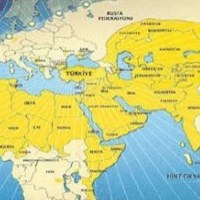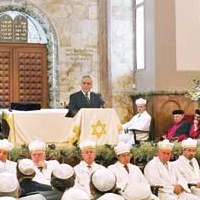![]()
Sat, Sept 25, 2010 | The Rubin Report | By Barry Rubin
Turkey’s Referendum Doesn’t Mean Popular Support for a Regime Aligning With Iran
It is true that the passage of the referendum in Turkey with 58 percent of the vote can be seen as a victory for the AKP regime. But that point shouldn’t be exaggerated. The bad feature of the reforms–in terms of consolidating the Islamist government’s power–is to strengthen the regime’s control over the courts and to limit further the autonomy of the Turkish army.
At the same time, though, there were many other provisions that the overwhelming majority of Turks wanted, expanding freedoms and civil liberties, reining in the possibility of military coups which those left of center have opposed in the past. Moreover, it was sold as a step toward Turkish entry into the European Union, still a prime goal though something that’s never going to happen.
There are many contradictory aspects. The legal changes strengthen women’s and privacy rights on paper but the regime has appointed hardly any women to high-ranking posts and has increased wire-tapping. To allow officers expelled from the army for Islamist activities to appeal the decision in court certainly seems to protect individual rights, but in practice it means that Islamists can now infiltrate the armed forces, organize politically, and if thrown out by the still-secular high command get it reversed by a regime-appointed judge.
I would bet that if it weren’t for fear of the provisions strengthening the regime–90 percent of Turks would have supported the proposed changes instead of just 58 percent. But that was part of the trick: putting in some key provisions fundamentally transforming the Turkish republic amidst twenty others that mainly referred to historical or abstract issues.
While the Washington Post gets it right, asking whether the regime isn’t reducing freedom and democracy in Turkey, the New York Times practically drools over the referendum and uncritically supports the regime in a shameful and quite ignorant manner:
“Turkey, already the Muslim Middle East’s sturdiest democracy, fortified its freedoms in a referendum on Sunday, with 58 percent of voters approving a package of constitutional amendments meant to end army meddling in civilian politics. That overwhelming ‘yes’ vote showed that Turks are fed up with ultimatums and coups and want elected politicians fully in charge.”
Um, yeah, but not pro-Iran, Islamist politicians strangling the independent media, packing the court system with its flunky judges, infiltrating the army with radicals, and arresting peaceful dissidents, right? Why don’t you mention that the referendum also tightens the regime’s grip on the court system–practically the last independent institution–and other instruments of power to an extent that many Turks find frightening? This is pure propaganda for the Islamist regime rather than a balanced assessment. Not a single criticism of the regime is mentioned, despite its growing power over the mass media, intimidation of critics, mass arrests, and other forms of repression and anti-democratic behavior.
One day this kind of editorial will be compared to that newspaper’s whitewashing of Stalinism in the 1930s and 1950s. Lenin once boasted that he would get the capitalists to sell him the rope with which to hang them. But even he thought that he would excite only their mercenary attributes while today Islamists often gain heartfelt and enthusiastic praise from their adversaries.
The fact is that the Islamist regime regularly use the praise it receives from U.S. officials, like this recent one from the assistant secretary of state and media to argue that it is really moderate; to demoralize its opponents; and continue to get away with its pro-Iran, Syria, Hamas, and Hizballah policy, while taking over more and more Turkish institutions. In other words, U.S. policy and media coverage isn’t just a bystander, it is foolishly assisting in the Islamization of Turkey.
Indeed, the regime is using U.S. support in its bid for re-election and to demonstrate its legitimacy to Turks. Here’s how the Islamist President Gül put it:
“The best indicator, showing that the same kind of importance is attached [to this relationship] by the US, is the fact that Turkey is the country to which President Barack Obama paid his first overseas trip soon after being elected, and the fact that he described our relations in the best way–as a model partnership,”
In other words, if Obama gives us a seal of approval, say the pro-Iran, pro-Hamas, pro-Hizballah Islamists who rule Turkey, how can anyone claim that we are on the side of the anti-American terrorists and revolutionary Islamists? The fact that Turkey presently is chairing the UN Security Council adds to the regime’s prestige internationally. Yet its support at home is declining.
The referendum, then, did not end the struggle over Turkey’s future but merely begins it. The word is that the next elections will be called for around June 2011, though of course this could change. If past experience serves, a perceived victory like the referendum makes the regime more arrogant and accelerates its move toward a more Islamist Turkey. Such an outcome would alienate more voters and make the next election a referendum against the anti-secular, pro-Iran current rulers.
And what will the ruling AKP party do with power? It isn’t just, for example, that the regime is pro-Iran but it is publicly, loudly, and outspokenly pro-Iran, daring the United States to do something about it.
So at the very moment that much of the world is tightening sanctions on Iran against its nuclear program, the Turkish regime is coming to the rescue. Prime Minister Tayyip Erdogan, at a meeting bringing more than one hundred Turkish investors together with Iranian First Vice-President Mohammad Reza Rahimi called for a tripling of Turkey-Iran trade. Meanwhile, Reuters has done an investigative report about how the Turkish regime is secretly helping Iran’s nuclear program. No problem with the Turkish regime, right?
Wrong. That government is becoming the main government-encouraged violator of the sanctions in the world. Part of the reason is to make money; part is to strengthen the regime’s ally in Tehran.
About the author,
Barry Rubin is director of the Global Research in International Affairs (GLORIA) Center and editor of the Middle East Review of International Affairs (MERIA) Journal. His latest books are The Israel-Arab Reader (seventh edition), The Long War for Freedom: The Arab Struggle for Democracy in the Middle East (Wiley), and The Truth About Syria (Palgrave-Macmillan). For the website of the GLORIA Center go here and for his blog, Rubin Reports, go here.



 RSS
RSS











Turkey’s Referendum Doesn’t Mean Popular Support for a Regime Aligning With Iran | #turkey #akp #islamism http://j.mp/bNuKLi
RT @CrethiPlethi: Turkey’s Referendum Doesn’t Mean Popular Support for a Regime Aligning With Iran | #turkey #akp #islamism http://j.mp/bNuKLi